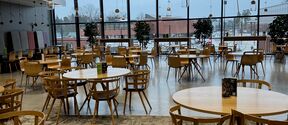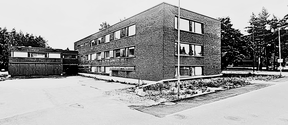Customer-oriented city

Haukilahti Upper Secondary School has operated on the Otaniemi campus since last autumn. The school tests a new way of organizing education, the School as a Service concept. The experiences have been excellent and this spring, there was a huge increase in the number of applicants to Haukilahti compared to the previous year. A second school, Pohjois-Tapiola Upper Secondary School, will begin to operate in connection with the University next August.
School as a Service is a concept developed jointly by Aalto University and the City of Espoo. It applies to practice the wider research and development activities in the field of service architecture of built environment, led by Professor of Service Architecture Jarmo Suominen at Aalto. The idea is to apply service-dominant logic to the development of built environment.
‘Espoo joined us boldly to develop the idea and try it out in practice. We had a joint trial, in which we particularly wanted to develop school in a networked and community-oriented direction and support learning objectives. Now we are scaling up this operating model. It is also perfectly applicable in the development of other public services in cities’, says Jarmo Suominen.
People meet and activities are mixed
In the operating model, services are organised into networks of user driven resources, which may consist of both public and private operations. These resources could be either existing buildings or facilities. New types of networks provide opportunities for people to meet and for various activities to mix, services will become more accessible for the customer.
‘The operating model is flexible for the local authority as decisions on the location of services can be made quickly as necessary. Services can be placed where people live or move around. A building serves as a service platform, empty spaces can be modified and made usable, and existing facilities can be made use of in a new and sustainable way’, says Suominen.
Jarmo Suominen is Professor of Service Architecture. Photo Anni Hanén.
Antti Ahlava is Vice President, Campus Development at Aalto University. Photo Mikko Raskinen.
Trialled on the Otaniemi campus
Aalto University's own campus already implements the operating model widely. Antti Ahlava, the Vice President responsible for campus development speaks of service architecture of urban districts and customers’ needs.
‘Our aim is to build the campus as a service, and the activities on the campus will be generated and modified from the user's point of view. The University will open to partners. Interaction and open innovation will increase. For example, a company might rent premises from several buildings or get access to co-working hubs, and be as close to collaboration partners as possible’, Ahlava says.
As regards service architecture, Aalto co-operates with the Media Lab of MIT in the United States, for example. They will develop a tool named CityScope together.
‘CityScope is a tool for scenario planning. It enables the different parties to co-design the area so that the cross effects of the different wishes can be discovered and the mixing of functions can be orchestrated. We apply this in Otaniemi when we plan entrepreneurship and housing and develop biodiversity, for example’, Ahlava says.
School as a Service becomes more international
The operating model has attracted global interest. The School as a Service concept has recently been granted innovation awards both in Finland and internationally, and Professor Jarmo Suominen has provided consultation to Tongji University, Aalto’s partner university in Shanghai in China, and to the development of public services in Scotland.
‘Tongji University will launch an upper secondary school in line with the School as a Service model in autumn 2017. The school is situated in a prime location in the Bund, the centre of business life in Shanghai. The school has its own hub, in addition to which it will use the resources in the area, such as sports facilities, business premises and galleries. Tongji University will provide approximately 40 per cent of the teaching in the upper secondary school’, explains Jarmo Suominen.
Disruptive innovation
Involving users in the implementation of the environments and services plays a central role in the operating model. Users means groups and institutions as well as individuals.
‘The innovation combines many topical themes. It is disruptive and provides a new user driven way to bring together demand and supply. The operating model is based on increasing accessibility as part of the sharing economy and on digital transition, and the model focuses on the users of the services’, Suominen explains.
‘The operating model is also in line with sustainable development. It increases the degree of utilisation of existing resources instead of just building new resources’, Suominen continues.
Read more news

Learning Lounge offers more study space on campus
Student, having a hard time finding a space?
Holiday breaks and special opening hours at Arts infra
Special opening hours and exceptions at Arts infra workshops.
Construction work at Otakaari 8 started
Renovation work at Otakaari 8 has started in January.






